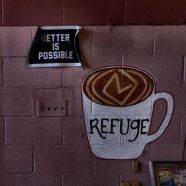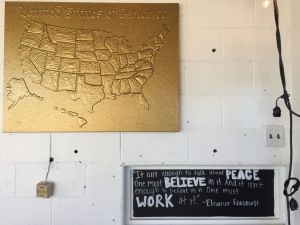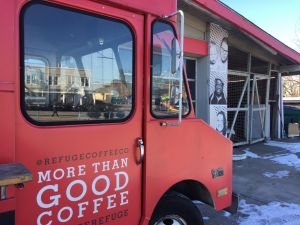Refuge
“Small Town . . . Big Heart,” says the sign at the city limits of Clarkston, Georgia. Just outside Atlanta, Clarkston is known internationally for welcoming and supporting refugees from all over the world and as the “Ellis Island of the South.” A hub of this welcoming spirit is Refuge Coffee, a dilapidated gas station and bright red truck from which baristas dispense coffee and pastries. Honing their job skills in their new country, the employees themselves are refugees. One popular young woman, Tha, just moved on from her post at Refuge to learn floral design, and she couldn’t be more excited.
Thanks to its mobility, Refuge Coffee extends its mission well beyond the borders of Clarkston. Like a bookmobile or food truck, Refuge makes its rounds throughout Atlanta, providing coffee and snacks at events of all kinds—refugees providing refuge.
The décor at the shop is eclectic to say the least. Mix-and-match couches, tables, and chairs fill the former service bays of the gas station. Art and inspirational messages adorn the walls. On one recent visit, I noticed a quotation from Eleanor Roosevelt painted on a chalkboard near my table: “It isn’t enough to talk about peace. One must believe in it. And it isn’t enough to believe in it. One must work at it.”
Working for peace is no easy task. Dr. Martin Luther King, Jr., whom we just celebrated and honored, challenged us with his words, beliefs, and actions so that we might live into a fuller love of one another.
Judging by our current political and social climate, we still have far to go.
A friend of mine, a refugee from Eritrea, lives in Clarkston with his wife and their three young daughters. Their journey here was long in the making. After ten years in a refugee camp in Ethiopia and wending their way through all the layers of bureaucracy, they finally got to Georgia. I met them shortly after their arrival as part of a cadre of tutors and other volunteers from an outreach program of St. Bartholomew’s, my Episcopal church in Atlanta. As a former teacher, I signed on as one of the family’s English tutors. At first, our lessons consisted of diligently working our way through an ESL workbook, but over time, they finally relaxed into less structured conversations about anything from the shock of ice and snow in Atlanta to why they celebrate Christmas on the sixth of January.
More recently we’ve been talking and writing about Instagram posts from my former sixth-grade student Linn. Originally from Sweden, she was in my class at the American International School of Budapest and, now in her twenties, lives in Addis Ababa. Formerly an intern with the United Nations, she is now conducting research for her master’s thesis on women’s work in the export-oriented garment industry. As she explores Ethiopia, landmarks from across the country appear in my feed. Churches cut into the rock in Lalibela, bustling Meskel Square in Addis, and the otherworldly, fluorescent Danakli Depression, one of the hottest places on earth and situated near the Eritrean border, pique my curiosity. One morning a photo from Linn’s weekend trip to Debre Zeyit in the countryside near the capital prompted a response from the wife: “My sister lives there!”
I visited the family the day after President Trump denounced Africa and Haiti. She leaned down for a hug—she is at least as tall as I am—and he greeted me with his usual shoulder bump, characteristic of Eritrean freedom fighters in their war for independence from Ethiopia. But we didn’t talk about politics. Instead, we discussed the coffee I had brought with me from Refuge. My friend’s wife, a native Ethiopian, informed me with a laugh, “That’s not coffee!” and pointed to her hotplate on which she would boil water and roast coffee beans herself. I laughed with her, because I knew just how good her coffee really was.
In the year and a half I knew her before her pregnancy with her third daughter, she would crouch down, almost squatting, tending the hotplate on the floor. When everything was ready, she would pour the right balance of coffee, milk, and sugar into small porcelain cups and serve us, her guests. One cup became two or even three, and cookies or orange slices would appear from the kitchen. I imagined that with a baby on the way, it finally became too physically uncomfortable to make coffee for us anymore. The hotplate and trey of cups still rest on the floor, unused.
But she is just as hospitable as ever, always asking us to sit and stay after our English lessons. She continues to serve snacks from the kitchen, and even if we don’t have much time, we accept before going on our way, fingers sticky from the oranges.
There is always food. To celebrate the newborn’s baptism last year, the family invited us to a party at their apartment following the service at the Ethiopian church. When I was welcomed inside, I entered a living room overflowing with friends, most of whom I’d never met and didn’t know they had. A cacophony of Tigrinya, Amharic, and English filled the air and piles of spongy injera, lentils, and spicy wat waited to be consumed. Another of my friends, who plays with the children while I tutor and who is known to them as Mama Marsha, showed me a video she captured on her phone of the baptism itself—music, dance, celebration. A priest singing, pouring water over the beautiful baby in her intricately laced, white gown. Her father and I clinked our beer bottles.
Now, on this day in January after Trump’s denigration of Africa, the three of us read together the true story about a hippo and tortoise in Kenya who, against all odds, became best friends. I couldn’t help but think about our becoming friends despite our outwardly different lives.
When I was about to leave, my friend gestured for me to follow him to the parking lot outside their apartment. He pointed to a minivan parked coincidentally next to my car, opened its doors, and showed me inside. Beaming, he told me he could now drive himself to work, his family to the doctor and to the store. I smiled, too, and congratulated him. Driving lessons and buying a car are huge steps toward independence in his adopted country.
A country that promises freedom and peace.
But when the country and its president do not live up to that promise, where do we go from here? Not all of us live in a big-hearted community like Clarkston or within the radius of the bright red Refuge Coffee truck.
But we can, in King’s words, stick with love as the ultimate force:
I have also decided to stick with love, for I know that love is ultimately the only answer to mankind’s problems. I know it isn’t popular to talk about it in some circles today. And I’m not talking about emotional bosh when I talk about love; I’m talking about a strong, demanding love. For I have seen too much hate . . . hate is too great a burden to bear. I have decided to love. If you are seeking the highest good, I think you can find it through love. God is love. He who hates does not know God, but he who loves has the key that unlocks the door to the meaning of ultimate reality.
So we seek and find refuge in strong, demanding love, in reciprocal hospitality, and, perhaps, in a strong cup of coffee.










Excellent article. Thoughtful and insightful.
Thanks, Mansa!
That’s uplifting thank you … we are all travelers in life, all some sort of refugee …. my teenage Boy Scouts taught me to ‘do a good turn every day’ …. your refugees band together to do so, a strong band of showing us love at work, true open hearted love …
Thank you, Ian!
Right on.
Thank you, Preeta! Good to hear from you.
Beautifully felt and expressed, Mark. What a blessing you and these friends are to each other. Friendships like these, which began with hospitality, openness, and good will are the greatest weapon against hatred and intolerance. I hope there will be many more Clarksons and red trucks.
Thank you, Sherley! I hope this family will eventually realize how important they are.
Beautiful! Thank you for sharing your experiences with us!
Thank you, Rossanne!
Mark, your story, and that of your friends, is inspiring. I really like the idea of the coffee shop as a place where there is “more than good coffee.” Thanks for sharing this story showing how kindness and acceptance, invite love. Nice to hear your voice in these words.
Thank you, Jen! I appreciate your words. If you ever make it to Atlanta, we’ll be sure to get coffee at Refuge.
How many steps must we take backwards before we can forge ahead again? How many?